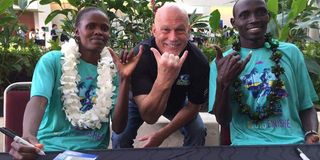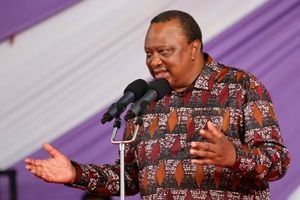Pacesetter Podcast: How Jon Cross’ faith in Kenyan runners paid off

Honolulu Marathon’s head of elite athletes Jonathan Cross (centre) with Kenyan marathon champions Brigid Kosgei (left) and Lawrence Cherono on the sidelines of the Honolulu Marathon in 2017.
What you need to know:
- Mostly there were Tanzanians there (UTEP) while the Kenyans, like Henry Rono and Samson Kimobwa, were up in Washington State University. Ibrahim Hussein went to school in Albuquerque, University of New Mexico.
Jonathan Cross is a patient and extremely focused man. Perhaps a character eked out of his practice as a dentist.
Having taken over the task of co-chairman of Hawaii’s Honolulu Marathon with fellow medic Jim Barahal, Cross was among few people in the 1980s convinced that African runners could actually do well in the marathon.
Prior to 1985, Kenyan and African marathon runners hadn’t made an impact in global marathon running.
And it was not until Cross and Barahal started using their contacts, and background as successful collegiate athletes — having met at the University of Michigan in Ann Arbor in 1975 — to rope in African athletes into the Honolulu Marathon that Africa’s talent was unveiled.

Honolulu Marathon’s head of elite athletes Jonathan Cross (left) with Kenyan marathon legend Ibrahim Hussein in 1985 in Honolulu, Hawaii.
The two were often criticized by other members of the Honolulu Marathon’s organizing committee for investing in African runners, but the success sparked by Kenyan legend Ibrahim Hussein’s breakthrough triumph in 1985 vindicated their African focus.
In the second installment of the Nation Sport athletics podcast series, titled The Pacesetter, we speak exclusively with Cross on the challenges he faced in the early days while getting African and Kenyan athletes to the Hawaii island race which is celebrating its 50th anniversary.
In the first podcast of the series, we spoke with Barahal, now President and CEO of the Honolulu Marathon, on Hussein’s early elite running career and how the Kenyan legend and University of New Mexico alumnus found a home on the island of Hawaii.
In that podcast, Barahal talked about his first encounter with Hussein and how the Kenyan legend helped lift the profile of the Honolulu Marathon.

Jonathan Cross, the elite athletes manager at the Honolulu Marathon “pulling off the rest of his hair” as he tries to get a telephone call from Hawaii through to Kenyan marathon star Ibrahim Hussein in Kenya. 1986. “I had to push the re-dial on my phone for over 45 minutes to get a call through. Plus I sent Telex messages from a business office next to (Honolulu Marathon President) Jim Barahal’s medical office,” he recalls.
Hussein had won a holiday trip to Hawaii from his university base in Albuquerque in 1984, and decided to run in the Honolulu Marathon that year while on his holiday.
Record-breaking race
But the storm and windy conditions that year were so bad that Barahal and Cross convinced him not to run and, instead, aim for a 1985 return to the island where he ran a course record-breaking race (2:12:08) and came back to defend his title the following year in another course record (2:11:43) before going on to become the first black man to win the New York and Boston marathons.
With telephone connectivity somewhat of a challenge locally in Kenya in the 1980s, international calls were even more difficult in getting through as Barahal and Cross reached out to African athletes to enlist for the Honolulu Marathon.

Nation Media Group’s Elias Makori (right) takes a selfie with Jonathan Cross, the elite athletes manager at the Honolulu Marathon, during the interview for the podcast in Honolulu, Hawaii.
“I had to push the re-dial on my phone for over 45 minutes to get a call through. Plus I sent Telex messages from a business office next to (Honolulu Marathon President) Jim Barahal’s medical office,” Cross recalls his attempts to get through to the athlete in our second podcast.
He did succeed in bringing the first batch of African, mainly Kenyan, star distance runners to Hawaiii in 1985, having joined the organizing committee of the Honolulu Marathon in 1984 as elite athletes co-ordinator alongside Barahal.
Besides Hussein, other big names who went through the hands of Barahal and Cross included two-time Boston Marathon winner Cosmas Ndeti, Jimmy Muindi, who won in Honolulu a record six times, Eric Kimaiyo and Ibrahim’s brother Mbarak Hussein, Michael Musyoki and Gabriel Kamau.

Jonathan Cross, the elite athletes manager at the Honolulu Marathon (left) with Tanzanian middle distance running legend Filbert Bayi, American legend Jim Ryun and his family in Honolulu, Hawaii, in 1986.
“I was trying to get a connection to get African athletes into our race,” Cross narrates in the latest podcast.
“In those days, most of the African runners were running for schools, and it was easier to recruit them because I could look up the results. Now there are so many that we have to use agents. These (student athletes) were all attending the University of UTEP (University of Texas, El Paso).
Mostly there were Tanzanians there (UTEP) while the Kenyans, like Henry Rono and Samson Kimobwa, were up in Washington State University. Ibrahim Hussein went to school in Albuquerque, University of New Mexico.
“We didn’t have any budget, but we had some complimentary tickets by Pan American Airlines that we could use. And so, they connected me with a Tanzanian who was going to university at the University of Texas, El Paso, and his name was Filbert Bayi.”
Cross’ attachment to African athletes came right from Ethiopian legendary marathon stars Abebe Bikila and Mamo Wolde.





